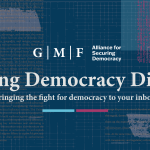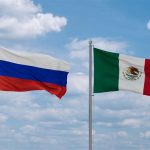Search for:

ISD-US and ASD Announce Merger
Announcements With great pleasure, ASD and the Institute for Strategic Dialogue-US (ISD-US) are announcing their merger effective January 1, 2026. You can read more about the merger here and below. To all of ASD’s champions over the last eight years, thank you for your support. We are proud of our achievements in pursuit of our mission to defend against, deter, and raise the costs on foreign interference and information manipulation in democracies. We’ve built innovative open-source research tools that have been widely used across sectors of society. We’ve developed numerous policy ideas that have ultimately been implemented on both sides of the Atlantic. And we’ve forged cou
ASD Research on Russian Information Laundering in Mexico Featured in the New York Times
The New York Times featured ASD's research, conducted as part of an investigation led by Factchequeado, on Russian information laundering in Mexico. Senior Fellow Bret Schafer told NYT: “This is the problem: You have the retreating from the information space globally, and in comes Russia. ... There remains a bit of a Cold War mentality about Russia taking it to the in their own backyard because they feel like the does it to them and their so-called sphere of influence. To gain influence, Latin America has long been seen as a priority for the Russians.” [fusion_button link="https://www.nytimes.com/2025/11/24/world/americas/russia-disinformation-mexico.html" title="" target="_self"

Borrowed “Voces”: How a Mexican Journalism Club Became a Mouthpiece for Russia and Cuba
Ten months after Russia’s 2022 full-scale invasion of Ukraine, the Club de Periodistas de México (The Club of Journalists of Mexico) bestowed awards upon three journalists from RT, a Russian state-owned media outlet, for their international coverage of the Kremlin’s “special operation in Ukraine”. In an acceptance speech on the winners’ behalf, Viktor Koronelli, the then-Russian ambassador to Mexico, stressed the importance of objective reporting and claimed the recognition confirmed Mexico’s support for Russia “in its fight against Ukrainian terrorism”. The awards from a club that, according to its website, has “driven journalistic excellence and fostered collaboration

Securing Democracy Dispatch
Announcements The Securing Democracy Dispatch will take a break next week to celebrate Thanksgiving. We will resume with a special edition the first week of December. Hamilton 2.0 Analysis Russian diplomats and state media focused on two main narratives this week: Epstein Files: Russian state media devoted significant coverage last week—roughly double that of Iranian and PRC state media—to congressional Democrats’ release of selected communications between disgraced financier and convicted sex offender Jeffrey Epstein and several notable individuals, including US President Donald Trump. Much of the coverage focused on Trump berating various reporters for asking questions

Securing Democracy Dispatch
Hamilton 2.0 Analysis Russian diplomats and state media focused on two main narratives this week: Predicting Zelenskyy’s Alleged Demise: Russian state media lifted the voices of a cadre of former US officials turned Russian state-media commentators to push a narrative that Ukrainian President Volodymyr Zelenskyy’s “days in power are numbered”. Lawrence Wilkerson, a former chief of staff to Secretary of State Colin Powell, told Sputnik News that when Zelenskyy loses the support of the “Nazis and oligarchs around him, he’ll either run off to one of his villas abroad or be killed”, which Wilkerson predicted would happen by Christmas. Sputnik also amplified an interview in

Securing Democracy Dispatch
Our Takes “No one in the political spectrum is happy with where we are from an information standpoint. Everyone looks at our current information system as failing us”, Senior Fellow Bret Schafer told WXXI’s Connections with Evan Dawson in a conversation about US polarization and foreign authoritarian actors’ use of AI. Hamilton 2.0 Analysis Russian diplomats and state media focused on two main narratives this week: Nuclear Testing: Russian officials and state media defended the country’s development of nuclear weapons and criticized the United States’ stated intentions to resume nuclear testing. Russian President Vladimir Putin declared that Russia does not threate
Authoritarian Governments Using AI to Undermine Democracies, Bret Schafer Tells WXXI’s Connections with Evan Dawson
Senior Fellow Bret Schafer joined WXXI's Connections with Evan Dawson to discuss how authoritarian governments have harnessed AI to supercharge the spread of false or polarizing information online to destabilize democracies. [fusion_button link="https://www.wxxinews.org/show/connections/2025-11-04/ai-propaganda-and-the-future-of-democracy" title="" target="_self" link_attributes="" alignment_medium="" alignment_small="" alignment="" modal="" hide_on_mobile="small-visibility,medium-visibility,large-visibility" sticky_display="normal,sticky" class="" id="" color="default" button_gradient_top_color_hover="" hue="" saturation="" lightness="" alpha="" button_gradient_top_color="" button_gradie

Securing Democracy Dispatch
Hamilton 2.0 Analysis Russian diplomats and state media focused on two main narratives this week: US Sanctions Against Russian Oil Companies: Russian officials and state media outlets condemned US sanctions against Lukoil and Rosneft, two Russian oil companies, and threatened a reciprocal response against the West. Russian President Vladimir Putin promised that these sanctions “will not significantly affect the economic well-being of Russia” yet warned that “ prices will surge” across the world, including in the United States. TASS cited European Commission Spokesperson Anna-Kaisa Itkonen, who cautioned that these sanctions may “partially affect” the EU’s energy securi

Securing Democracy Dispatch
Our Takes Public and private actors who work to counter foreign information manipulation and interference (FIMI) face a proliferating number of state and nonstate actors, new threat vectors, and increasing hostility toward counter-FIMI efforts. Civil servants and civil society must continue collaboration and efforts to change the terms of public debate over how these operations affect democratic freedoms, Managing Director David Salvo tells the London FIMI Forum. Hamilton 2.0 Analysis Russian diplomats and state media focused on two main narratives this week: Possible US-Russia Summit in Budapest: Russian officials and state media accused the West, but especially the EU, of un
David Salvo Discusses Countering Foreign Information Threats at London FIMI Forum
Managing Director David Salvo discussed ways to combat foreign information manipulation and interference in a changing global landscape at the fifth annual London FIMI Forum, hosted by the EU Delegation to the United Kingdom. [fusion_button link="https://youtu.be/RPRGlX0BU_I?si=lX-9dIjQ9tmv2zhs" title="" target="_self" link_attributes="" alignment_medium="" alignment_small="" alignment="" modal="" hide_on_mobile="small-visibility,medium-visibility,large-visibility" sticky_display="normal,sticky" class="" id="" color="default" button_gradient_top_color_hover="" hue="" saturation="" lightness="" alpha="" button_gradient_top_color="" button_gradient_bottom_color_hover="" button_gradient_bo
